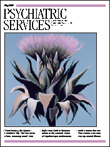Alzheimer: A Journey Together
Francesco Caracciolo was creative, restlessly curious, peripatetic, and incautiously embracing of experiences and of people, especially those remote from modern preoccupations. His life was a store of unusual adventure until Alzheimer's disease began to drain it from him. His wife, Federica, a translator for a United Nations agency and now a volunteer counselor for families of Alzheimer's patients in her native Italy, has written about their six years of adaptation to this disease. She has created something unique—and subtly provocative—in this warm, poignant, and engrossing book, which is as much a revelation to health care providers as to the families whom it is directed.
I have read the phrase "caregiver burden" uncritically, and sympathetically, in the past, because I associated the term with the struggles of many families whom I have assisted as they coped with illness, disability, and death. One could imagine that concept occurring frequently in an account such as Federica's. Although she is resolutely respectful of her husband's dignity, she does tell us about pain, frustration, and fear with remarkable clarity. There are the first intimations of peculiarity and intemperateness, the consequent depredations of Francesco's character and physical presence, and the later, sad but strangely comforting peace which they discover together. But Federica rejects the notion that her responsibility to her husband is a burden. Her writing reveals such compassion and insight through their travails that we are not only not afraid but eager to take that relentless journey with her.
It is, unquestioningly, a journey of discovery and love. Federica is not a saint, though she is a remarkable person. She is at times afraid of her husband's unpredictable behavior. She wishes, in difficult moments, that he were dead. She imagines the challenges she faces with despair and terror. She unflinchingly details the physical, financial, and emotional demands she has accepted; the tentative withdrawal of friends which left them deeply alone; and the insensitivity and unhelpfulness of some of the health care providers she encountered—though she judges no one.
As she struggles to remake her life after her husband's death, she says, "I grieved for all the times we had been together; the happy as well as the dark, because we had lived them so intensely…. I was nostalgic for the precious days of being at Francesco's side, even though at times he was not always aware of my presence, and the strength I had derived just from giving and the joy therein. I realized that, in the end, our journey together instead of a grievous duty had turned into a love story." It is Federica Caracciolo's great achievement that we find this affirmation entirely plausible and feel through her story the strength and mystery of that love.
The book begins in media res, which creates a sense of immediate intimacy and spontaneity. It is as if we are privileged acquaintances, opening a letter with news of her family's progress. As obscure references become clear, Federica, in assuming this familiarity, is able to make us trust her as guide and mentor.
Although she understands well the neurological implications of Alzheimer's, she seeks and finds meaning in gestures. She inexhaustibly discovers creative ways to stimulate Francesco's memory and to recover elements of their past. She is determined to find what pieces of her husband remain, despite the losses. And she is rewarded so many times that she can bear, a little longer, to fight on.
I confess that it was with trepidation that I opened this book, uncertain that it would hold me, uncomfortable with the subject of a feared and too common illness. Indeed, I might never have read it had it not been assigned to me for this review. What a loss that would have been, and what providence that I was able to share these lives, which I will never forget.



